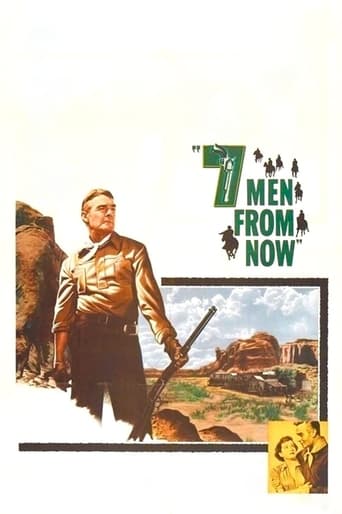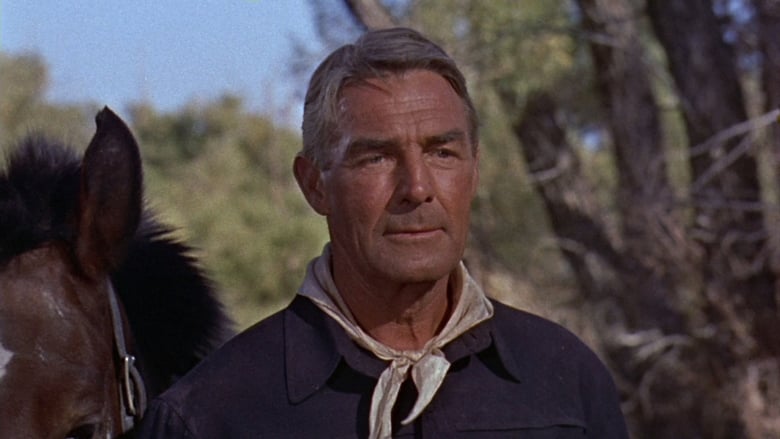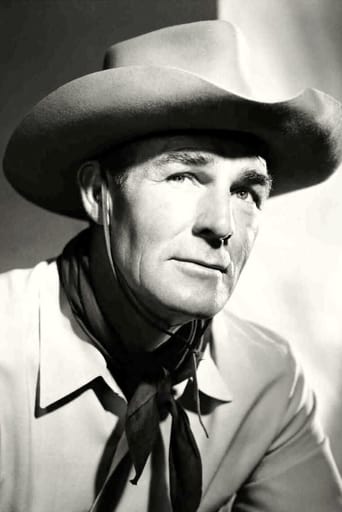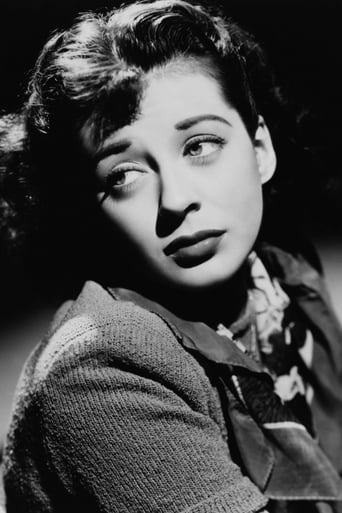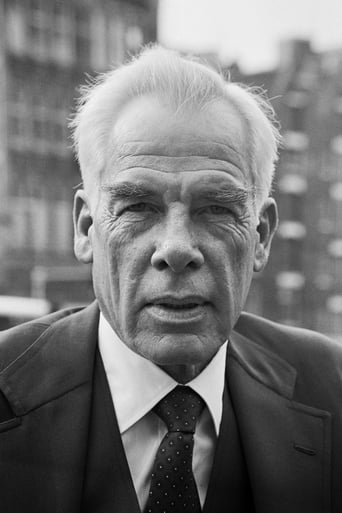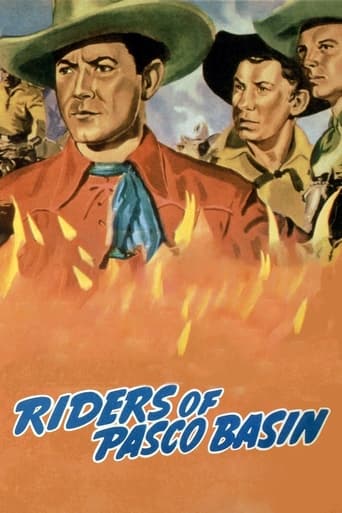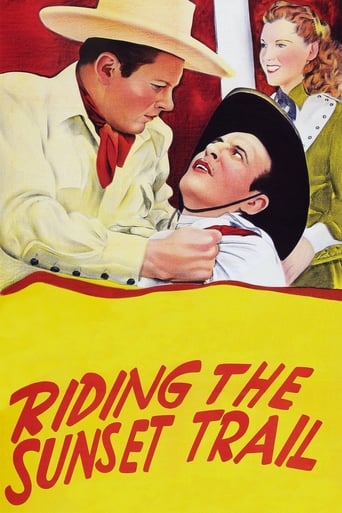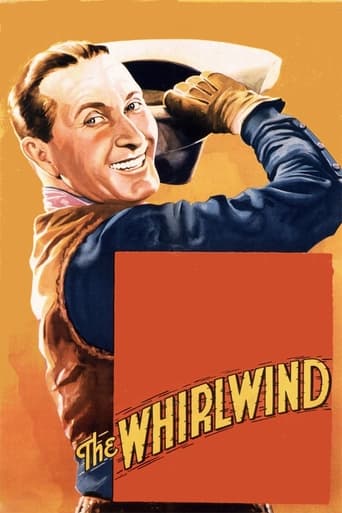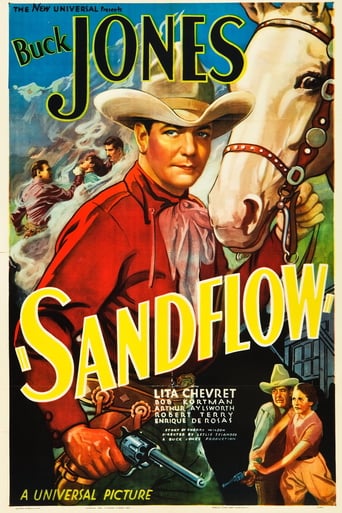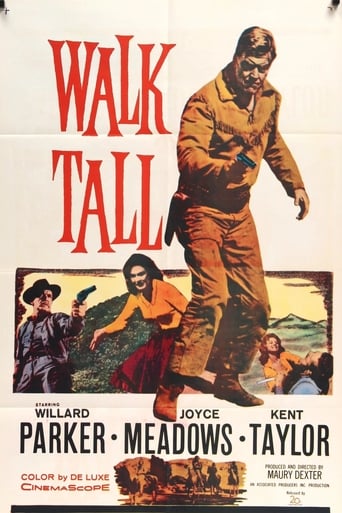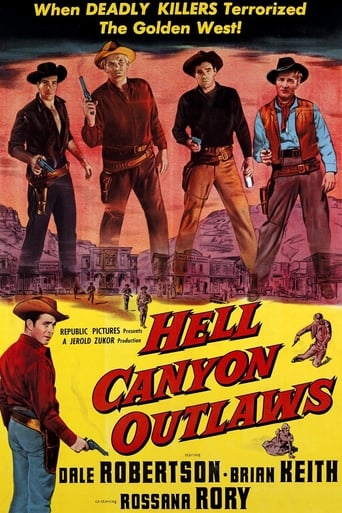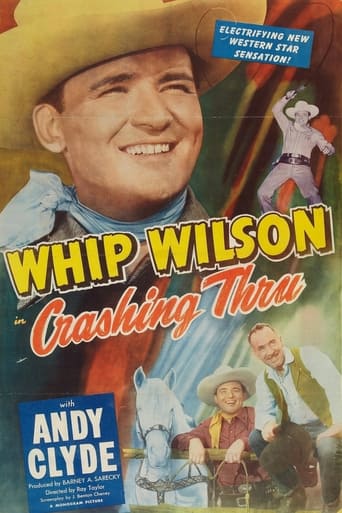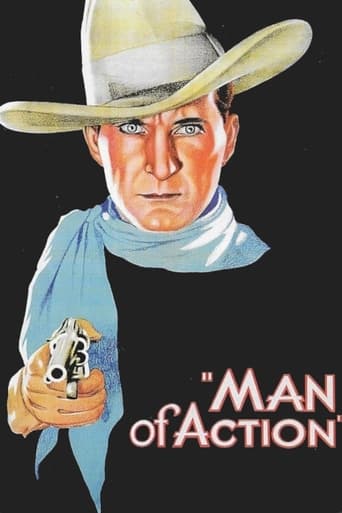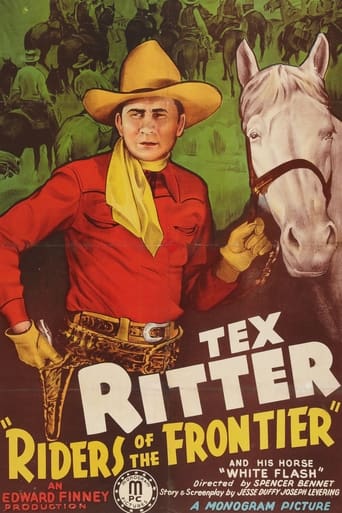7 Men from Now (1956)
A former sheriff relentlessly pursuing the 7 men who murdered his wife in Arizona crosses paths with a couple heading to California.
Watch Trailer
Cast


Similar titles
Reviews
You'd be safe calling this one of your better underrated Westerns. Randolph Scott of course is always solid, but what I liked about this picture was the way it took it's time to reveal Ben Stride's back story, leaving the character somewhat ambiguous following the opening scene when he gunned down two of the Wells Fargo bandits. The story line also dangled the character of John Greer (Walter Reed) as a question mark, as we learn about his role concerning the gold heist via the brains behind the robbery. This was all quite cleverly written, with the added twist of a possible romantic angle between Stride and Annie Greer (Gail Russell).There's something to be said about that romantic angle. Director Budd Boetticher uses an interesting technique to film what one might consider a love scene between Stride and Mrs. Greer. With Ben Stride bedding down for the night underneath the Greer wagon, Annie Greer appears in a seductive night dress and speaks to Stride as he's about to go to sleep. The way it's filmed, it's almost as if both characters are speaking face to face, such is the connection Boetticher establishes between the two characters. There's another scene later on between the two in which Stride wards off a near kiss from Annie, quite unlike any situation I've run across in a film before, providing a conflicted moment for the film's hero who needs to remain focused on his original mission.If you're counting coup on the film's title, there are indeed seven men called to account for the Wells Fargo job. Interestingly it was Lee Marvin's character who had a hand in taking out a couple, once in the desert during the Chiricahua attack when he saved Ben's hide, and then near the finale when he took it to Payte Bodeen (John Larch). When it came to the final confrontation between Stride and Masters (Marvin), you couldn't blink or you would have missed that incredulous 'how'd you do that?' look Masters gives his adversary when he gets out-gunned. One of the more satisfying showdowns you'll run across in a Randolph Scott Western.
Seven men rob Wells Fargo, steal a lot of gold, and kill Ben Stride's wife in the process. He sets out to avenge her death, and while he is at it, he retrieves the gold as well. Justice is served. But there is another injustice that has to be addressed in this movie.When Stride first happens across John Greer and his wife Annie, we can see right off that this guy is a wimp, and we wonder how he ever got himself a wife like Annie. Even when she falls in the mud, she oozes sex appeal. Later, when they are joined by Bill Masters and his partner Clete, Masters poses the question to Clete as to why a full woman like Annie would settle for half a man. He is right. Greer just does not deserve Annie.A man like Masters is the sort who cannot help stepping on something little, so one night while Stride, Greer, Annie, and Masters are inside the covered wagon, Masters starts talking about how deliciously desirable Annie is, practically ravishing her with his words, while her husband, who is being verbally cuckolded, just sits there and takes it. Masters also talks about how he once knew another woman like Annie, who eventually ran off with a real man, suggesting that she has a thing for Stride. And apparently she does, because later when Stride says goodbye to her, she moves in to be kissed, although Stride does not avail himself of the opportunity. For one thing, he is a recent widower, and for another, he is too upright to take another man's wife.We know that Stride will eventually kill all the men who stole the gold and caused his wife's death, because that is routine for a Western. It is the injustice of Greer's being married to Annie that worries us, for there is no standard convention for handling that situation. When Stride discovers that Greer had been hired by the robbers to transport the gold, he takes the box of gold away from Greer and tells him and Annie to go west. We get a sinking feeling. The wrong will never be righted. Fortunately, Greer decides to go south to inform the sheriff of Stride's situation.Before Greer can get to the sheriff's office, the leader of the men who hired him to transport the gold shoots him down in the street. Because Greer knowingly risked his life and lost it trying to help Stride, Masters says he was wrong, that Greer was a man after all. Well, it is nice of Masters to say that, being generous about the man now that he is dead, but we know better. After all, Greer was not wearing a gun, and in a Western, that is always the mark of a weakling. And thus it is that when Greer is shot in the back unarmed as he walks to the sheriff's office, we breathe a sigh of relief. Though Annie says she loves her husband, yet we know that this is for the best.Later, after Stride has returned the gold, he tells Annie where he will be working as a deputy and indicates that he would be glad to see her, if ever she should be passing by that way. She quickly decides that after a decent interval (both have recently murdered spouses), she will take him up on that offer. This makes us feel good, because Stride is the real man she has needed all along. When they finally get married and he gives it to her the way her first husband never could, justice will finally be restored.
Randolph Scott lucked out that, as John Wayne was preparing to star in this film, he got a call from John Ford, wanting him to star in "The Searchers". Wayne decided he couldn't star in both films, as the present film couldn't be put off until later. Hence, Scott was called upon to take his place. Thus, the serendipitous relationship between Scott and director Bud Boetticher began. It would continue for 6 more films(which ,unlike this film, were not financed by Wayne's company), during the next 4 years, and would serve as a model for Scott's final Hollywood film: "Ride the High Country", after Beotticher had become obsessed with doing a film about his favorite bull fighter. This is probably the most interesting of the Beotticher-Scott westerns, having the most complex plot and including the charismatic Lee Marvin as Scott's chief nemesis. You may also prefer the introverted, rather sad-faced, Gail Russell, with her beautiful blue eyes, over her successors. She doesn't really do a lot in her significant screen time. In this, she was rather typical of Boetticher's women, who served mainly as an object of desire for their looks, rather than for a forceful personality or fitness as a partner in the stark landscapes(mostly the spectacular Alabama hills) that Scott's characters inhabited. If you would like to see more of Gail, I would suggest the B&W "Angel and the Badman". Sylvia Sydney, in "On the Trail of the Lonesome Pine" also much reminds me of her in looks and personality.One of the common features of most of this film series is a young couple or married woman that Scott's character serendipitously becomes attached to, for a time. The husband is characterized as a weaker personality than Scott's character, not worthy of his desirable or wealthy wife, and eventually is killed(except in the case of "Comanche Station", where the husband is encountered only at the end, and is blind). We've seen this plot feature before, in Scott's "Hangman's Knot", for example. A largely unspoken and undemonstrative romantic relationship develops between the woman and Scott's character, but they maintain a formal emotional distance, often in respect for their present or deceased spouse. Also, Scott is usually about 30 years older than the woman. In some films, such as this one and "The Tall T" and "Westbound", the woman retains hope at the end that she can eventually wrangle at least an intermittent relationship with Scott. But, in the last 2 films of this series, plus the subsequent "Ride the High Country", the woman is encouraged to form or retain a romantic relationship with a younger character, often with a tarnished past.Another common thread of most of these films is a charismatic devious villain: in many ways the opposite of Scott's reserved, straight- forward, character.(In "Ride the High Country", Joel McCrea was cast in Scott's usual role). In most of the films, this character was previously known by Scott and spends much of the film riding with him. Often, as in the present film, there are two distinct villains, who are at cross purposes with each other. In this film, they are Bill Masters(Lee Marven) and Payte Bodeen(John Larch), who both hope to end up with the gold in that stolen Wells Fargo box. We also see this in "Westbound", "Ride Lonesome " and "Ride the High Country". Often, as in this film, one of these villains helps protect Scott(or McCrea)from death at times, to help achieve their goal.In most of these films, the traveling group reaches its apex in complexity at an isolated stagecoach way station which, for various reasons, has been recently abandoned by most or all of it's employees. "Ride Lonesome " and "Comanche Station" also follow the present film in having in depth discussions during several nights, in which they learn more about each other. These two films also mimic the present one in having one or more hostile encounters with Native Americans.In this film, Scott(as Stride) has dual goals relating to the Wells Fargo robbery, in recovering the gold and in gunning down the 7 men who killed his wife in the robbery. Masters(Marvin) is the charismatic sneering villain, well known to Scott, who seems to know about the individuals involved in the robbery, without having been directly involved himself!? He joins up with Scott and the Greer husband and wife traveling homesteaders(Walter Reed and Gail Russell), hoping Scott will lead him to the strong box in his quest to kill the 7 men. He saves Scott's life in an Apache attack, killing one of the 7 who mysteriously appears during the midst of this battle!? Later, he dispatches 2 more of the 7, including the colorless Bodeen leader of the thieves, who have come to ambush Scott, who now, unexpectedly, has the strong box. Of course, Masters wants the box for himself, preferably without having to kill Stride, whom he respects. But , Stride refuses to give up without a quick draw contest. End of story.I should point out some of the curious geographical name anomalies included. Clearly, this story takes place in SE Arizona, which did then include the mentioned Fort Crittenden. However, Flora Vista is in NW NM, and Silver Springs in is western NV!
This is the first Western of the Boeticcher - Scott combination I have watched. The movie is a typical Western with an element of journey across the Wild west. It can be called a mixture of 'Stagecoach' and 'The Searchers' in terms of the journey and the search for somebody. It is a rather short movie with the typical western circumstances to boost it's pace. Randolph Scott was in his 50's when he did this movie. The tiredness and lack of the western lead man charm is visible. John Wayne, who is also the producer of this movie was going to play his part. But he didn't because he was busy. I wish he had. Lee Marvin on the other hand is the face-saver. He pawns Scott right, left and center. Excellent portrayal of a grey shade character by him. He is slowly turning out to be one of my favorite 'Western Heroes' although mostly he plays the supporting actor. A pretty average western but worth a watch for Marvin.Rating : 7/10

